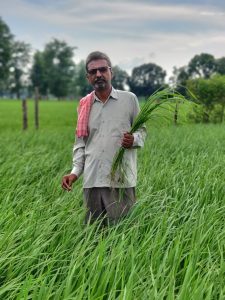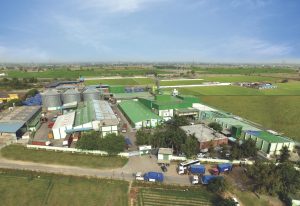There are 2.8 million organic farmers in the world, and more than 30% of them—an astounding 1,149,000—are in India, according to the International Federation of Organic Farming Movements (IFOAM).
However, unlike their organic farming peers in more developed organic markets, such as the United States and Europe, many of India’s organic farmers lack the opportunities to earn a good income.
But one of India’s largest organic food companies, Nature Bio Foods, is helping to change that by boosting the livelihoods of the country’s farmers and revitalizing the farmers’ rural communities.
Roots in rice production
Nature Bio Foods is India’s leading organic food company, accounting for 12% of all the country’s organic exports and 75% of its organic rice exports.
Launched in 1997, NBF has its roots in rice production as a subsidiary of LT Foods, a global leader producing basmati rice, which is sold under the Royal brand.
“Since we hailed from a rice company, we started up growing rice,” says Rohan Grover, director at Nature Bio Foods.

Nature Bio Foods rice farmer
Nature Bio Foods produces and sells 40 varieties of organic rice; they also supply rice flour, which is used in a variety of applications including rice cakes, baked goods, and baby foods. The company’s rice is also made into rice milk. Along with rice, Nature Bio Food’s organic product range includes soybeans and soybean meal, flax, sesame seeds, red and yellow lentils, mung beans, and chick peas.
Nature Bio Foods exports its products primarily to Europe and the United States. In Europe, Nature Bio Foods supplies organic products to many leading co-packers who then supply most of the retail chains such as Aldi, SPAR, Alnatura, Albert Heijn, and Coop, among others. They also supply organic rice to one of Italy’s largest pasta companies. In the U.S., Nature Bio Foods works with leading organic distributors and aims to expand its presence.
“I think India could be a big source of organics to the U.S.,” Grover says.
Works with 60,000 farmers
Nature Bio Foods’ success is based on its 60,000 farmers who grow organic crops on 84,000 hectares (207,564 acres). The vast majority have very small farms, just 2.5 to 5 acres on average, according to Grover. The farmers are spread through nine states in India with some in remote regions of the foothills of the Himalayan Mountains.
“What we were able to do over the years is to go there, work with farmers, understand the farming industry, and then give them the right education, techniques, and training on how they can certify the crops, and grow more organic, increase their yields, and have effective crops and soil,” Grover says.
The farmers are trained in organic practices and given seeds, organic fertilizers, and biopesticides. One farmer in each group of 50 is designated as an “organic friend,” who is responsible for distributing crop inputs to all the group members.
Nature Bio Foods works with entire villages and tries to recruit all of its farmers, usually an average of 500 farmers.
“It doesn’t help us or the entire organic movement if only a few farmers are practicing organic, and the next farm over is not because there’s a high chance of pesticide drift coming from different fields,” Grover says.
Nature Bio Foods provides the farmers with the opportunity to supply the company’s crops and earn an income in the process, something they wouldn’t normally have the ability to do.
“We give them a fair price, premiums from 15% to 70%, depending on how challenging the crop is,” Grover says. “They enjoy the premiums and the benefits of growing organic.”
Invests in rural communities
Nature Bio Foods focuses not only on helping the farmers but also the farmers’ communities. The company invests funds to develop villages and infrastructure such as bridges and roads. They have built nine schools for children to attend. They’ve established sewing centers where women of the villages work and earn money. They have also built biogas plants to create fuel for cooking foods. They are installing solar lights in the villages and fencing around farms.
“Unfortunately, we are still a young country, only 70 years after our independence, and we still need a lot of infrastructure growth. Initiatives like ours make a big difference,” Grover says.
According to Grover, Nature Bio Foods’ fair-trade certification also benefits the farmers and their communities. “We generate about $500,00 to $600,000 every year as a fair-trade premium on our fair-trade crops, which gets distributed to the farmers and their families. This is an advantage to those villages,” Grover says.
Nature Bio Foods sources organic ingredients such as rice from remote regions in the foothills of the Himalayan Mountains in the states of Utter Pradesh, Jammu, and Uttarakhand. Farmers in those areas were naturally producing organic; they never had access to pesticides, Grover says.
“The pesticide companies didn’t have reach to those remote regions,” he says.
Another advantage to rice grown in those remote regions is that there are no problems with heavy metals such arsenic and cadmium, which can even be found in organic rice grown in other countries.
“The soil, air and water (in those regions) are not polluted,” Grover says. “We have 15 rice projects there, and they consistently test for low or no heavy metals.”
Multiple certifications to ensure organic integrity
The organic crops are processed at Nature Bio Foods’ five dedicated organic processing facilities, three in Bhopal and two in Delhi in central India. The facilities are GFSI (Global Food Safety Initiative) certified, which ensures that they are processing safe food for consumers. Nature Bio Foods achieved this certification because it produces ingredients such as rice flour that are used in baby foods. According to Grover, baby food brands in the U.S. and Europe who buy the company’s ingredients have visited and audited their processing facilities.

Nature Bio Foods processing facility in Sonepat in the Indian state of Haryana
“These companies visited us to check where the products are coming from; they visited farmers and our facilities, and were convinced of the quality of our infrastructure,” he says.
Nature Bio Foods carries other certifications. Control Union is Nature Bio Foods’ primary organic certifier. Other organic certifications include Biosuisse, India’s Organic Standard (BPOP), the European Union standard, JAS (Japan), USDA Organic, and Naturland, a Germany-based organic certification and organization that works with smallholder farmers throughout the world. There is also fair-trade certification. Biodynamic agriculture projects for rice, flaxseed, pulses, red lentils, and sesame seeds are certified by Demeter.
“We have close to about 200 certification points, which means that about 200 audits happen every year on different certifications,” Grover says.
With increasing concerns about fraud in the organic market, particularly with products exported to the U.S., how does Nature Bio Foods address those concerns?
“We have one integrated supply chain that ensures the product is coming straight from the farm,” Grover says. “There aren’t multiple channels that companies have to go through to source from us. Products are completely traceable with multiple certifications. Brands trust our supply chain. We are responsible and ensure the sustainability of the supply chain.”
Based on smallholder farms but with a global reach, Grover says Nature Bio Foods can provide the best of both.
“Everyone wants to go global but, with us, you can go global and still be local.”





